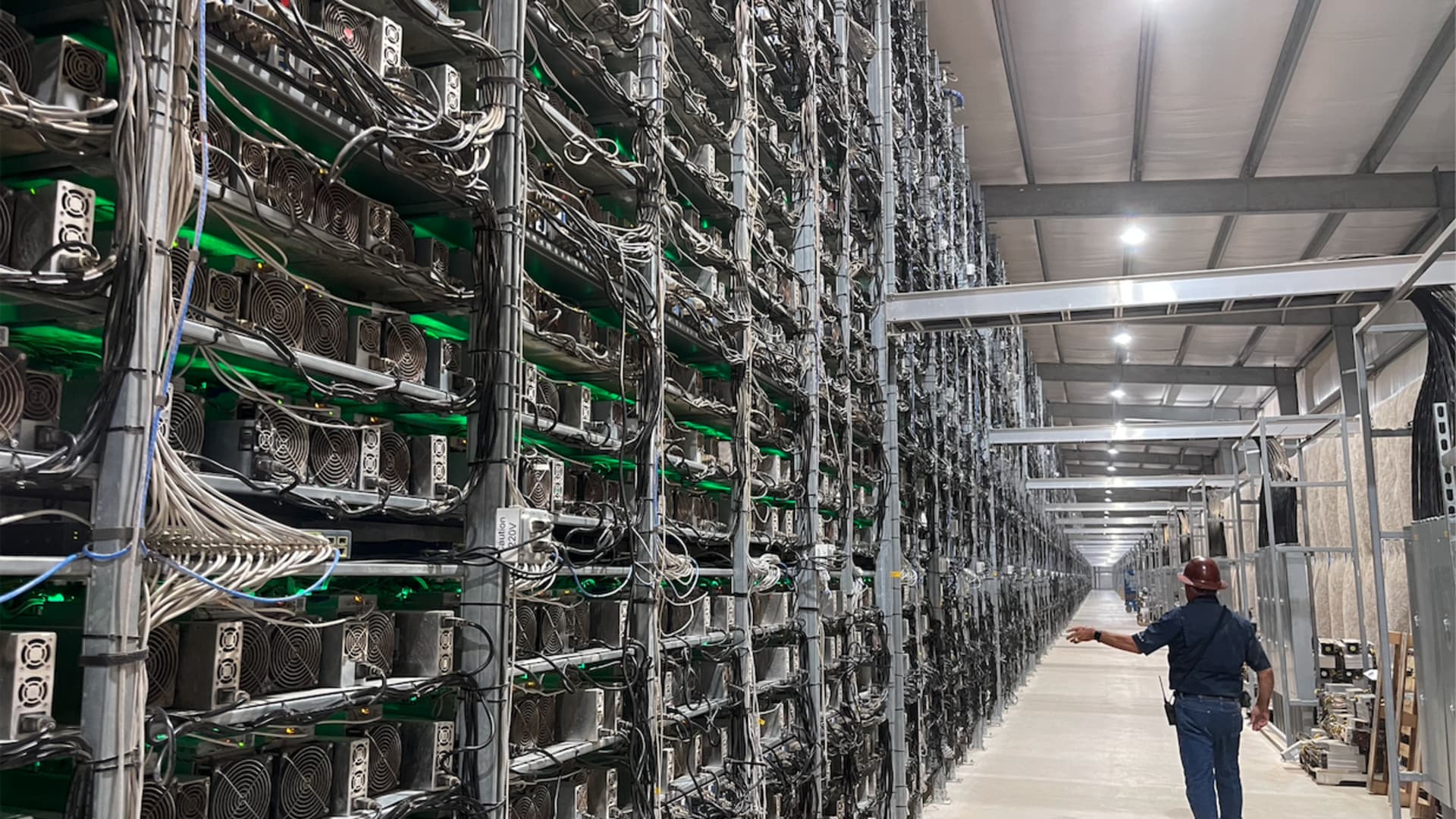

Whinstone CEO Chad Harris takes CNBC on a tour of the largest bitcoin mine in North America.
Crypto companies are suddenly at the center of deal-making. The catalyst is artificial intelligence.
Bitcoin mining companies have expansive data centers, with access to fiber lines and large amounts of power across the U.S. They’re exactly the types of facilities needed for compute-intensive AI operations, which means their sites and technology are in high demand.
Meanwhile, miners need to diversify. Following the bitcoin halving in April, an event that happens about once every four years, the business of generating new tokens has become much less profitable. JPMorgan Chase analysts wrote in a report earlier this month that “some operators are feeling the financial pinch from the recent block reward halving, which cut industry revenues in half, and are actively exploring exit strategies.”
With the burgeoning AI industry in need of capacity and bitcoin miners in search of new ways to generate returns on their hefty capital investments, mergers, financings and partnerships are rapidly coming together.
On Tuesday, U.S. bitcoin miner Core Scientific announced an expanded deal with CoreWeave, an Nvidia-backed startup that’s one of the main providers of the chipmaker’s technology for running AI models. Core Scientific will deliver 70 megawatts of computing infrastructure to support CoreWeave’s operations.
Core Scientific said the deal will generate an additional $1.2 billion in revenue over 12 years, on top of an existing arrangement that is expected to bring in $3.5 billion. In total, the company plans to provide about 270 megawatts of infrastructure to CoreWeave by the second half of 2025, with the possibility of adding an additional 230 megawatts at other Core Scientific sites.
Earlier this month, CoreWeave offered to buy Core Scientific for $1.02 billion, not long after their initial agreement. Core Scientific rejected the bid. The company, which returned to the public market in January after going through bankruptcy, is currently worth about $1.8 billion.
“The world is changing, and many data centers built in the last 20 years are not suitable to support future computing requirements,” Core Scientific CEO Adam Sullivan said in Tuesday’s press release.
A day before that announcement, bitcoin mining group Hut 8 said it raised $150 million in debt from private equity firm Coatue to help it build out its data center portfolio for AI.
Hut 8, based in Miami, is one of many crypto mining companies pivoting to AI. The company said in its first-quarter earnings report last month that it had purchased its first batch of 1,000 Nvidia graphics processing units (GPUs) and secured a customer agreement with a venture-backed AI cloud platform. Hut 8 generates 6% of sales from AI, according to CoinShares.
“The broader market is beginning to appreciate the scarcity of high-quality power assets, and Hut 8 has built a deep pipeline of highly attractive expansion assets,” Robert Yin, a partner at Coatue, said in the financing announcement.
Hut 8 CEO Asher Genoot recently told CNBC his company “finalized commercial agreements for our new AI vertical under a GPU-as-a-service model, including a customer agreement which provides for fixed infrastructure payments plus revenue sharing.”
Bit Digital dumps tokens to buy GPUs
Bit Digital, a bitcoin miner that now derives an estimated 27% of its revenue from AI, said on Monday that it had entered into an agreement with a customer to supply 2,048 Nvidia GPUs over three years, doubling the number of processors it has providing the unspecified client.
To fulfill the contract, Bit Digital ordered 256 servers from Dell Technologies, and will soon deploy them at a data center in Iceland. The company said the contract is expected to generate $92 million in annual revenue. It’s paying for the GPUs, in part, by dumping some crypto.
“The Company intends to finance the deal with a mixture of cash and digital assets on the balance sheet,” Bit Digital said.
Bit Digital also entered a so-called sale-leaseback agreement for half of the new GPUs, “which will reduce the company’s capital outlay commensurately.” With the leaseback, another company owns those GPUs, and Bit Digital leases them back, generating revenue by providing the technology to customers.
People wait in line for t-shirts at a pop-up kiosk for the online brokerage Robinhood along Wall Street after the company went public with an IPO earlier in the day on July 29, 2021 in New York City.
Spencer Platt | Getty Images
While most of the recent crypto deals involve miners, there has been at least one big notable exception.
Earlier this month, trading platform Robinhood agreed to a deal to buy Bitstamp, a Luxembourg-based crypto exchange, for around $200 million in cash.
Bitstamp holds 50 active licenses and registrations across the globe, and is popular in Europe and Asia. The purchase helps Robinhood, a retail-focused trading app, bolster its crypto operation to better take on Binance and Coinbase.
The deal, due to close next year, comes as Robinhood faces regulatory challenges in the U.S. over its crypto dealings. In May, the company said it received a Wells notice for its crypto operations. The Securities and Exchange Commission has also sued Coinbase and Binance.
Robinhood had $4.7 billion in cash and equivalents at the end of the first quarter. Its stock is up 75% this year.








